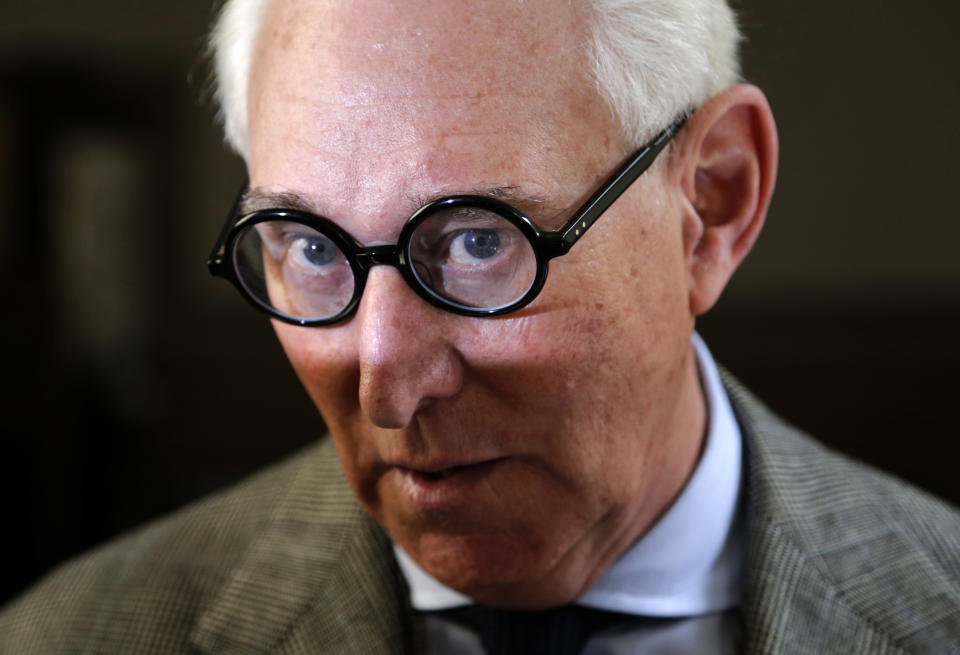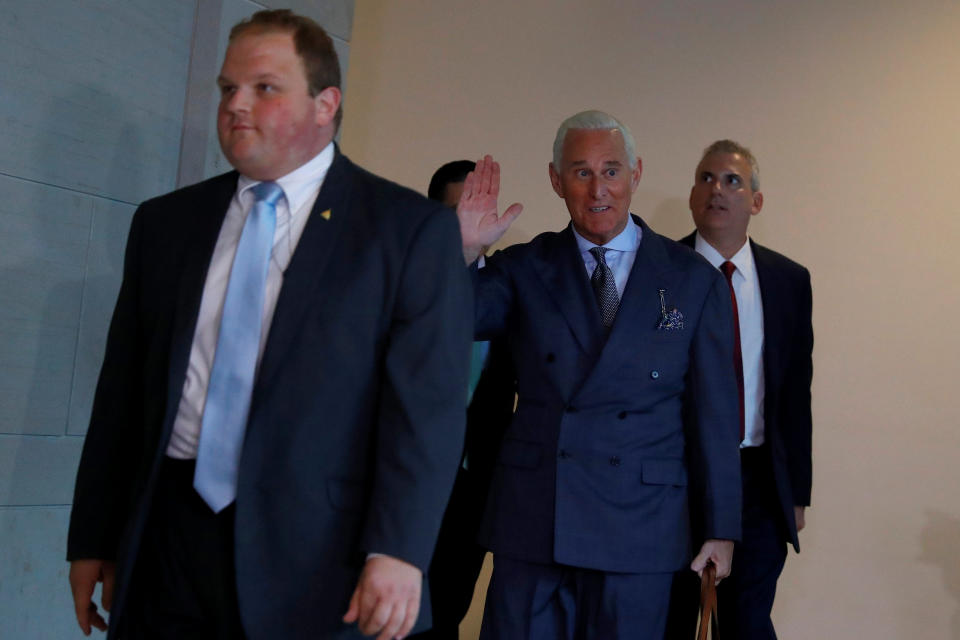Roger Stone accuses House intel panel of 'cowardice' for insisting on closed-door testimony
WASHINGTON — In a feisty statement to be delivered to the House Intelligence Committee on Tuesday, Roger Stone, President Trump’s longtime political adviser, denies any collusion with Russia during last year’s presidential election and accuses panel members of “cowardice” for insisting that he testify behind closed doors rather than in a public session.
While acknowledging that he is “no stranger to the slash and burn aspect of American politics today” and that “some may label me a dirty trickster, … there is one ‘trick’ that is not in my bag and that is treason,” Stone says in a lengthy, 47-page statement, complete with accompanying exhibits and copies of his tweets, that he provided in advance to Yahoo News.
“Multiple members of this Committee have made false allegations against me in public session in order to ensure that these bogus charges received maximum media coverage,” Stone says about accusations that he had insider knowledge of WikiLeaks’ dumps of emails that U.S. intelligence officials say were hacked by Russian intelligence services. “Now however, you deny me the opportunity to respond to these charges in the same open forum. This is cowardice.”

“What is it you fear? Why do you oppose transparency? What is it you don’t want the public to know?” Stone asks. “I can assure each of you, I will not let myself be a punching bag for people with ill intentions or political motives.”
Stone’s long-awaited appearance before the committee is shaping up to be a combative confrontation with Democratic committee members who have publicly accused him of being a key player in Russian efforts to meddle in last year’s presidential election.
In particular, Stone is expected to be closely questioned about multiple tweets during last year’s campaign suggesting that, at critical moments, he was tipped off to WikiLeaks founder Julian Assange’s plan to release damaging emails about Hillary Clinton and her campaign chairman, John Podesta — material that U.S. intelligence officials say came from Russian state-sponsored hacks.
Among those tweets was one on Aug. 21 in which Stone wrote, “Trust me, it will soon the [sic] Podesta’s time in the barrel.”
Then, just days before the WikiLeaks release of Podesta’s emails on Oct. 7, Stone tweeted on Oct. 2: “Wednesday, @HillaryClinton is done. #Wikileaks.” That was followed on Oct. 3 by another one: “I have total confidence that @wikileaks and my hero Julian Assange will educate the American people soon.” Then on Oct. 5, Stone tweeted: “Libs thinking Assange will stand down are wishful thinking. Payload coming.”
Stone says in his statement he first learned that WikiLeaks had emails about Hillary Clinton last summer, from Assange’s own Twitter account. He then reached out to “a journalist who I knew had interviewed Assange to independently confirm this report” and the unnamed journalist — whom he alternatively characterizes in his statement as an “an intermediary” and “go between” — then assured him that damaging material about Clinton would be released in October.
But, despite once vowing to “answer every question” the committee asks him, Stone told Yahoo News last Friday that he will refuse to identify the intermediary to the committee — a stance that is likely to lead to charges that he is stonewalling the panel’s inquiry.
”I’m not gonna say,” Stone said of the journalist’s identity. Asked on what grounds he will refuse to answer the panel’s questions, he replied: “On the grounds that I’m not there under a subpoena. And when something is off the record with a reporter, it’s off the record. He told me this off the record. It’s a two-way street. I don’t burn reporters with whom I’ve made an agreement.”

In his statement, Stone also insists that he had no direct communications with Assange himself. “I have never said or written that I had any direct communication with Julian Assange and have always clarified in numerous interviews and speeches that my communication with WikiLeaks was through the aforementioned journalist,” he said.
Yet in his Yahoo News interview last Friday, Stone acknowledged that he had in fact communicated directly with Assange, although after the election.
“We’ve had some exchanges — via email,” Stone said during the interview. “But again, they’re innocuous. … I wrote a piece for the Daily Caller that he liked and he complimented it. That kinda thing.”
Stone’s statement takes a combative approach to the House Intelligence Committee. He disputes that the Russians were responsible for hacking emails from the Democratic National Committee and questions why the unanimous conclusions of U.S. intelligence agencies that they did should be accepted uncritically.
“The mantra-like repetition of the claim by our vaunted 17 intelligence agencies that the ‘Russians’ colluded with the Trump campaign to affect the 2016 election, does not make it so,” Stone said. “These are, after all, the same entities who insisted the North Koreans would not be able to launch a viable rocket for 3-5 years, that insisted Saddam Hussein was in possession of WMD, that there was no torture at Abu Ghraib prison, and that the government had no bulk data collection program, until Edward Snowden revealed otherwise.”
Read more from Yahoo News:
Clinton agrees with interviewer that authenticity is a ‘bulls*** concept’
Roger Stone: Manafort’s mood ‘amazingly good’ despite coming indictment
Locals take on China’s invasion of Africa’s biggest economy: ‘They’re like Goliath, we’re David’
Photos: Health care bill protesters descend on Senate hearing


